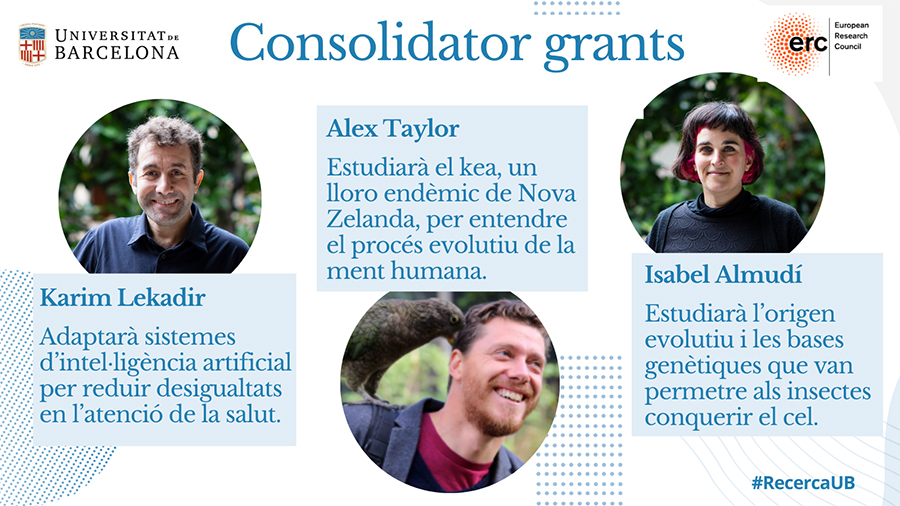The UB receives three European grants
One of them, Alex Taylor will carry his research at UBneuro
The researchers of the University of Barcelona Karim Lekadir, Alex Taylor and Isabel Almudí will carry out their research thanks to three consolidator grants given by the European Research Council (ERC). Today, the institution published the last grant call, which has selected 313 projects in Europe in its last grant call, published today. Catalonia obtained 8 out of the 17 that were given to Spain, three of them given to the UB, which becomes the Spanish institution to receive the most grants in this call. The grants awarded to the UB researchers account for more than 6.3 million euros.
From New Zealand to Barcelona
Alex Taylor, associate professor at the Faculty of Psychology of the University of Auckland (New Zealand), will carry out his research at the University of Barcelona. With a funding of 2.1 million euros, his project “Testing for the universal mind using probabilistic inference (UNI PROB)” aims to test whether there is a deeper structure to intelligence, namely a universal mind that evolves repeatedly in distantly related species. By comparing the probabilistic inferences of humans and birds, UNI PROB hopes to uncover the first evidence for this universal mind and open up a new frontier in cognitive science.
Karim Lekadir, Ramon y Cajal researcher at the Faculty of Mathematics and Computer Science of the UB, received 2.2 million euros to conduct the research study Inclusive Artificial Intelligence for Accessible Medical Imaging Across Resource-Limited Settings (AIMIX). “The aim of the project is to study how artificial intelligence can adjust to the needs and features of local populations with limited resources and high healthcare demands, such as those in Africa”, says Lekadir, whose research will improve the development of accessible creative health solutions in depressed populational environments. “An application is, for instance, conducting ultrasound tests to pregnant women who live in remote areas of Africa”, notes the researcher.
Lekadir believes that artificial intelligence “will revolutionize healthcare because it will enable professionals to conduct clinical tasks in a faster, more precise and efficient way”. Also, it will be a way to reduce “inequalities in healthcare” in areas with limited resources and to diagnose severe diseases faster to find “the best treatment”.

Isabel Almudí, Beatriz Galindo researcher at the Faculty of Biology and member of the Biodiversity Research Institute (IRBio), received 2million euros to study the evolutionary origins and the genetic bases of insect wings and the visual system in male mayflies. “These are two morphological novelties that had a great impact on the evolution and diversification of insects”, says Almudí. The project treats an issue on which many researchers have debated for years: the origins of wings, “thanks to which insects conquered the sky”, notes the researcher. Also, it will be the first time for a project to use mayflies as the model organism to use omics.
Consolidator Grants
The Consolidator Grants are aimed at researchers of any nationality with 7-12 years of research experience since the completion of their PhD. obtained their doctoral degree. According to the European Research Council, 2,652 applicants submitted their proposals, obtaining only a funding of 12%. The grants have been equally given to both male and female researchers.



No Comments